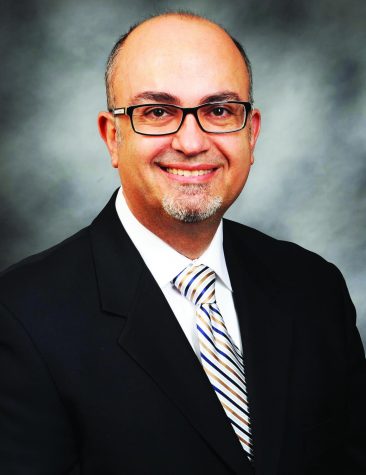Different Angles of the Same View: WWIII
January 26, 2020
As the world celebrated the new decade, President Donald Trump ordered the assassination of Qassem Soleimani, major general of the Islamic Revolutionary Guard Corps. According to Trump, his actions were aimed at preventing Soleimani’s “imminent and sinister attacks on American diplomats and military personnel.” Since the death of Soleimani, social media platforms have blown up with speculation of an impending world war. Commenters expressed their political views by posting memes of American citizens possibly getting drafted for the war, engaging in partisan arguments and reacting to threatening videos made by Iranian officials warning the United States to “prepare for the worst to come.”
I asked three professors– one from the history department, a second from the sociology department and a third from the political science department–of the NEIU Main Campus to participate in an interview about their views of Trump and Soleimani, as well as the assassination of the latter, and to discuss whether or not a third world war is on the horizon.
Ph.D., 2011 at the City University of New York – Graduate Center. Dr. Adler is expertly skilled in American Politics.

For the public reading this interview, may you please introduce yourself and tell us anything about you?
A: I’m William Adler, Associate Professor of Political Science at NEIU. I teach courses on Public Policy, Public Administration, the American presidency and elections.
What is your stance on Donald Trump? How has he served in his capacity as President of the United States?
Trump has clearly been one of the most controversial presidents in our lifetimes. The polarized political environment we live in means that people on both sides have deeply held and strong views on rejecting or approving of his performance. My own view is that his management of the presidency has been very weak overall, and his ability to work with Congress has also been minimal. He has been successful at weakening many environmental regulations and at changing the immigration rules in ways that make it significantly more difficult for people to immigrate.
What is your stance on Qassem Soleimani and his performance and impact in his capacity as Major General of the IRGC (Islamic Revolutionary Guard Corps)?
Solemani was the number two general in Iran and a top official running the IRGC. He was clearly working hard to advance Iran’s interests in the region which included opposing American forces and American allies in the Middle East. There’s no question that he was responsible for the deaths of many American service members and responsible for wreaking havoc across the region, in places such as Yemen and Iraq.
Did you think that Trump’s ordering of the assassination of Qassem Soleimani was done with the best intentions? Why?
Trump seems to have been convinced that killing Solemani would be a blow against Iran. My understanding is that he was looking to punish Iran for the attacks upon the American embassy in Iraq and other recent provocations.
Do you think an Iranian retaliation is imminent?
Iran has already shown that it is willing to respond against the U.S. with the bombing of our bases in Iraq. I do not think this will be the end of Iran’s actions against us or U.S. allies and I anticipate that the situation will deteriorate further.
Do you think that the United States may be in for a third world war? Why?
A third world war seems unlikely.
Do you have any closing statements that you would like to say before we end the interview?
Dr. Adler did not comment on this question.
History, Ph.D., 2010 at the University of California Santa Barbara. Dr. Farzaneh is expertly skilled in: History of Iran, the modern Middle East, Islamic civilization and political Islam.

Associate Professor of History and the Principal of the Mossadegh Initiative
For the public reading this interview, may you please introduce yourself and tell us anything about you?
F: My name is Mateo Mohammad Farzaneh. I’m an associate professor of history at NEIU. I teach all related courses to the Islamic Civilization in Spain and the Middle East, and I primarily focus on political Islam in Iran and Iraq in the 19th and 20th centuries.
What is your stance on Donald Trump? How has he served in his capacity as President of the United States?
We live in very interesting times, to put it mildly. This president and his administration are perhaps the most unconventional in the way of implementing foreign policy in the history of the United States. That is also enhanced by the massive role of technology and the flow of information that makes President Trump’s action obvious for many who are focusing on his actions.
What is your stance on Qassem Soleimani and his performance and impact in his capacity as Major General of the IRGC (Islamic Revolutionary Guard Corps)?
Qassem Soleimani, who was affectionately referred to as “Hajj Qasem” by many, was perhaps the closest military general to the Iranian supreme leader Ayatollah Ali Khamenei. He began his voluntary work in the Islamic Revolutionary Guards Corps at the age of 20 and served in the Iran-Iraq war first as a volunteer fighter and then as the commander of the 41st infantry division of the IRGC from his hometown of Kerman in the south. He was appointed to the commander of the Qods force–that is the foreign arm of the IRGC–and was a key figure, if not the mastermind behind pushing ISIS back from Iran and Syria. He worked in close cooperation with American-led coalition forces and was instrumental in that regard in defeating ISIS. Therefore, his assassination is a big loss for all who are interested in having peace in the Middle East.
Did you think that Trump’s ordering of the assassination of Qassem Soleimani was done with the best intentions? Why?
Killing perhaps is part of the unconventionality of this president and his administration. As many have pointed, one obvious reason for his action could be to divert attention from his impeachment ordeal by creating a crisis not totally appreciating the consequences of that action.
Do you think an Iranian retaliation is imminent?
United States will receive the wrath of the Iranian-backed militia inside Iraq and Lebanon as has been the case for some time now.
Do you think that the United States may be in for a third world war? Why?
I certainly hope not. However, we have witnessed in history how things can spiral out of control and wars follow. This might not be any different. It all depends on people in Washington (D.C.) and Tehran.
Do you have any closing statements that you would like to say before we end the interview?
Dr. Farzaneh did not comment on this question.
Ph.D., Sociology, 2007 at Loyola University in Chicago. Dr. Galary is expertly skilled in: Economic Sociology, Women’s and Gender Studies.

Sociology, Women’s and Gender Studies Professor
For the public reading this interview, may you please introduce yourself and tell us anything about you?
G: My name is Aneta Galary. I’m an instructor in the Department of Sociology. I’ve been teaching at NEIU since 2005.
Thank you for giving me the opportunity to express my views on the murder of General Qassem Soleimani.
What is your stance on Donald Trump? How has he served in his capacity as President of the United States?
A lot of things could be said about Donald Trump and his presidency, but I don’t think we have enough time to discuss them. Many people see him as an inept bully who spews blatantly hateful rhetoric, bigotry, and unabashed ignorance. While this is all true, I think that Trump is not that much different from his predecessors in violating international law and thinking that the US is above the law. If you compare some of the things that have taken place under his presidency to what happened under other U.S. presidents, he’s not an outlier or an anomaly. The U.S. government has a long history of ordering extrajudicial assassinations, unilaterally imposing illegal economic sanctions on other countries to strangle their economies—which end up killing thousands of people, overthrowing democratically-elected governments, dropping bombs on civilians, etc.—not to mention its long history of discrimination, illegal imprisoning and killing of its own citizens.
What is your stance on Qassem Soleimani and his performance and impact in his capacity as Major General of the IRGC (Islamic Revolutionary Guard Corps)?
Neither Trump nor Pompeo offered any evidence showing that General Soleimani was preparing an “imminent attack” on the US. Most likely, it’s a lie fabricated to justify his assassination. Again, this is not atypical. Bush, Cheney, and Rumsfeld lied about WMDs. Lyndon Johnson lied about the Gulf of Tonkin. And so on.
Soleimani played a key role in the fight against ISIS. He offered support to the Houthi in Yemen to help them defend themselves from US-backed Saudi attacks. He defended his country against US imperialism and was respected and loved for it by many Iranians. He was a national hero. Thousands attended his funeral in Teheran alone. I think that Iranian people are in a better position to judge his performance and impact than we are.
Did you think that Trump’s ordering of the assassination of Qassem Soleimani was done with the best intentions? Why?
It’s impossible to guess what Trump was thinking and what his intentions were when he order(ed) the extrajudicial association of Soleimani because Trump is unpredictable. But it’s clear that murdering a foreign general and diplomat on a peace mission can never be in the interest of US foreign policy. It’s also clear that neocon war hawks, Evangelicals and their odd friend Netanyahu got the attack on Iran that they wanted. Frankly, I don’t think there was a strategy behind the murder of Soleimani. It was probably opportunism. The Trump administration knew that Soleimani was on his way to meet with the Iraqi Prime Minister, they knew his whereabouts, and they decided to kill him.
Do you think an Iranian retaliation is imminent?
Let’s think about this. In the eyes of many Iranian people, Americans murdered their national hero, a top commander, a diplomat on a peace mission. He was not killed on a battlefield; he was murdered outside Baghdad International Airport during peacetime. How would Americans respond if another country murdered one of their top generals outside Heathrow Airport in London? It’s even hard to imagine that! But we are so used to our government’s criminal acts that they don’t shock us. We don’t think of them as crimes. Iran, like any other country, has the right to defend itself. It has already retaliated against the U.S. for the assassination. Iranian missiles have passed through the U.S. air defenses and hit their targets—two airbases where drones and helicopters were stored. Americans were unable to intercept them. I think that this is a great embarrassment for the United States.—the greatest military power in the history of humanity that spends more on its military than the next seven countries combined—and a victory for Iran. Iran’s retaliation demonstrated that U.S. military bases in the Middle East are vulnerable. Its success will encourage non-state actors in the Middle East—such as the Hezbollah in Lebanon—to respond to U.S. aggression. Iran has a large arsenal of missiles which could be used in case of war. However, I don’t think that Iran wants a war with the United States—note that Iranians chose not to target the barracks in which the American soldiers were sleeping. Most likely, Iran will pursue further diplomatic isolation of the United States. Let’s not forget that the United States also killed a top Iraqi commander. As could be expected, the double assassination has galvanized international public opinion against the United States. It has also brought Iran and Iraq closer in their opposition to U.S. imperialism. Iran’s influence in the region has increased, not diminished.
Do you think that the United States may be in for a third world war? Why?
Wars are very profitable, so they never end and always expand. Weapons manufacturers, oil companies, and defense contractors would be very happy if the United States went to war with Iran. It’s up to the American people what will happen. If we don’t want never-ending and always-expanding wars, we need never-ending and always-expanding anti-war movements.
Do you have any closing statements that you would like to say before we end the interview?
It’s up to the American people to put pressure on their government and demand the closure of U.S. military bases around the world. Our government has to stop meddling in the affairs of sovereign countries, violating international law, and bring Americans responsible for war crimes to justice. Unfortunately, our corporate media and the so-called journalists have been shamelessly misinforming and deceiving instead of educating the public. The fact that they are not even debating whether the assassination of the commander of a sovereign country in peacetime was lawful is a sign of their ignorance, arrogance, foolishness and, frankly, their moral bankruptcy.
We are drowning in an ocean of lies. It’s our civic and moral responsibility to sort through the lies, judge and think for ourselves, and take appropriate action.
Thank you!









